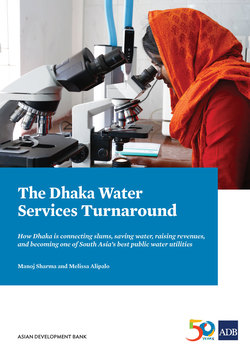Читать книгу The Dhaka Water Services Turnaround - Manoj Sharma - Страница 6
На сайте Литреса книга снята с продажи.
ОглавлениеForeword
This publication features a project that turned around an urban water utility in South Asia, and offers a good example for other similar utilities in South Asia. ADB’s support to the Dhaka Water Supply and Sewerage Authority (DWASA) provided a breakthrough in the delivery of clean, reliable, affordable, and continuous water to the residents, including the poor, in Dhaka. This is not just a breakthrough for Dhaka or the rest of Bangladesh, but for the region of South Asia, which struggles with the lowest service levels for safe drinking water and where continuous water supply is an exception rather than a norm in most cities.
This publication looks at the key success factors that other utilities are taking note of: the zonal approach to rehabilitating and managing urban water services, trenchless technology for expeditiously laying pipes, the importance of community mobilization, and connecting the urban poor—and keeping them connected—through community-managed approaches. ADB invested $212.7 million in the Dhaka Water Supply Sector Development Program to bring reforms to Bangladesh’s urban water services sector, build capacity of Dhaka’s water utility, and to reach out to the poor and slums. ADB’s investment was critical part of a multi-donor partnership to bring investments to the entire urban water sector in Bangladesh.
The situation before the project was clearly suboptimal: lack of surface water had led to unsustainable reliance on groundwater; the city did not have the infrastructure to deliver clean or 24x7 water supply nor could it do that with high water losses and the proliferation of suction pumps that the public had resorted to using as a coping mechanism. The ADB investment supported the “district metering area approach,” which divided the city into zones with independent systems that could manage flow and pressure, and control nonrevenue water or water losses. This approach expedited the rehabilitation of the entire city and was supported by trenchless technology—horizontal drilling machines that drive water pipes into the ground without having to dig the trenches that disrupt traffic, interrupt water supplies, and involve expensive road restoration or relocation of and compensation to the affected persons. The project also demonstrated that the urban poor are a viable market and one that should be taken seriously. Dhaka’s sprawling slums have been substantially benefitted under the project.
Like any ambitious investment in a city of the developing world, the Dhaka Water Supply Sector Development Program was not without its challenges. Determined leadership was the key to keeping stakeholders engaged and committed to the new ideas and approaches being tried by the program. This publication is full of voices that attest to the struggle they faced and overcame, and the impact that reliable water supply has made on people’s health, happiness, and prosperity. Because of the project, a generation of children in Dhaka’s slums is the first to experience clean water available just outside their doorsteps. Their communities are being transformed by the power of water—shanties are being reinforced with concrete walls, pathways are being paved with drainage, and businesses are thriving. The poor have not been left behind and are benefiting exponentially more, which is what good development strives for and has accomplished here.
We congratulate our DWASA colleagues and counterparts in the Government of Bangladesh on their accomplishments on this project and wish them similar success on the subsequent projects.
Hun Kim
Director General
South Asia Regional Department
Asian Development Bank
